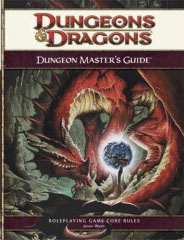 Okay, I talked about dissociated mechanics before the 4th Edition rulebooks came out. I was concerned because these types of mechanics make it more difficult for me to do the things I generally enjoy doing in a roleplaying game — immersive roleplaying and world-building. In a worst-case scenario, dissociated mechanics actively impede any kind of roleplaying — when the game mechanics require you to make decisions as a player which have no analogy to the decisions of the character, the game has stopped being a roleplaying game and become something else. (Not necessarily something bad, just something else.)
Okay, I talked about dissociated mechanics before the 4th Edition rulebooks came out. I was concerned because these types of mechanics make it more difficult for me to do the things I generally enjoy doing in a roleplaying game — immersive roleplaying and world-building. In a worst-case scenario, dissociated mechanics actively impede any kind of roleplaying — when the game mechanics require you to make decisions as a player which have no analogy to the decisions of the character, the game has stopped being a roleplaying game and become something else. (Not necessarily something bad, just something else.)
In practice, I found 4th Edition to be as disappointing as I expected in this regard. The experienced players did, in fact, feel more distanced from their characters by the dissociated mechanics and ended up roleplaying less and focusing on the mechanics more.
The newbie players, on the other hand, roleplayed quite a bit. But this roleplaying was noticeably divided from the mechanical portion of the game — it was like improvising a story around a game of Chess or Life rather than using the improv structure of the roleplaying game.
This type of roleplaying is not unusual for new players. It doesn’t really matter what system you’re using: If they latch on strongly to the concept of roleplaying a character, new players will usually become very creative and think completely outside of the box.
What I discovered, however, was that the dissociated mechanics strewn throughout 4th Edition made it very difficult for me to respond to their creativity.
New players tend to sidestep the game mechanics and interface directly with the game world. When the mechanics are directly associated with the game world, this is easy to handle: You simply take what the new players are telling you, interpret it mechanically, and resolve it. But dissociated mechanics, by definition, create an interpretive barrier.
This problem actually comes from two directions: First, there’s the “you can’t do that” problem. This is what happens when something should be possible in the context of the game world but is impossible in the context of the mechanics. These types of conflicts are black marks on the game design, but are relatively easy to deal with in practice: You simply invoke Rule 0 and let the logic of the game world override the illogic of the game mechanics. Managing the huge number of effective house rules this requires eventually becomes a headache, but in the short term it’s not insurmountable.
The other aspect of this problem, however, is more insidious. 4th Edition is filled with dissociated tactical decision points. (For example, the fact that certain powers are more useful against minions than non-minions and vice versa.) These have no touchstone with the game world, which means that whenever somebody is trying to engage directly with the game world every single one of these decision points becomes a stumbling block. Dissociated mechanics, by their very nature, insist that you pay attention to them instead of your character’s world if you want to play the game.
Long story short: Dissociated mechanics are bad and 4th Edition is riddled with them.











